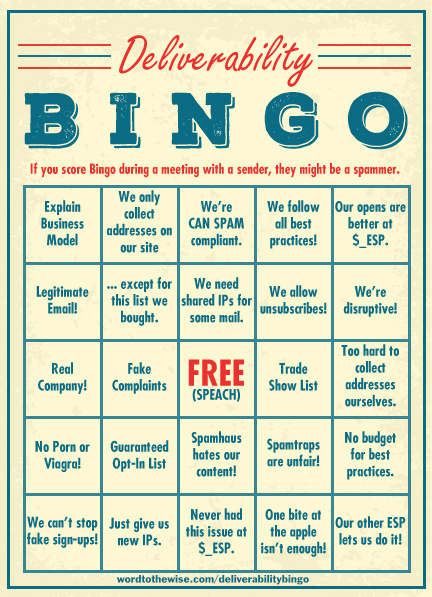Happy March! Here’s a look back at our last month of email adventures.
 It was a busy few weeks for us with the M3AAWG meeting in San Francisco. We saw lots of old friends and met many new people — all in all, a success, despite the M3AAWG plague we both contracted. Hot topics at the conference included DMARC, of course, and I took the opportunity to write up a guide to help you determine if you should publish a DMARC policy.
It was a busy few weeks for us with the M3AAWG meeting in San Francisco. We saw lots of old friends and met many new people — all in all, a success, despite the M3AAWG plague we both contracted. Hot topics at the conference included DMARC, of course, and I took the opportunity to write up a guide to help you determine if you should publish a DMARC policy.
On the subject of advice and guidance, Ask Laura continues to be a popular column — we’ve had lots of interesting questions, and are always looking for more general questions about email delivery. We can’t tackle specifics about your program in this column (get in touch if we can help you with that directly) but we can help with questions like “Will our ESP kick us off for mailing purchasers?” or “Help! I’m confused about authentication.”
Continuing on the authentication front, I noted that Gmail is starting to roll out some UI to indicate authentication status to users. It will be interesting to see if that starts to affect user (or sender) behavior in any way. In other interesting industry news, Microsoft has implemented an Office 365 IP Delisting page. I also wrote a followup post to my 2015 overview of the state of ESPs and purchased lists — it’s worth checking out if this is something your business considers.
I wrote a post about security and backdoors, prompted by both the FBI/Apple controversy and by Kim Zetter’s talk at M3AAWG about Stuxnet. These questions about control and access will only get more complicated as we produce, consume, store, and share more data across more devices.
Speaking of predictions, I also noted my contribution to a great whitepaper from Litmus that explores the state of Email Marketing in 2020.
As always, we looked at some best practices this month. I wrote up some of my thoughts about data hygiene following Mailchimp’s blog post about the value of inactive subscribers. As always, there isn’t one right answer, but there’s a lot of good food for thought. And more food for thought: how best practices are a lot like public health recommendations. As with everything, it comes down to knowing your audience(s) and looking at the relationship(s), which, as you know, is a favorite subject around here.
Read More

